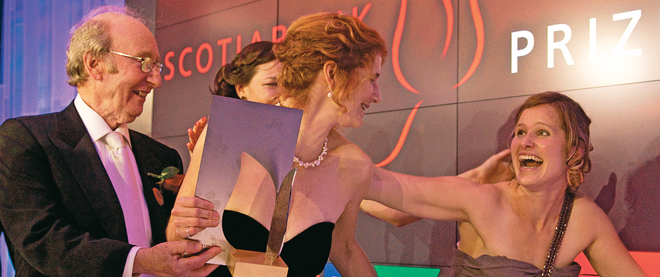A Giller for the masses
People were so excited about the new award, they voted for books they hadn’t read
David Cooper/Toronto Star/Getstock
Share

It turned out to be a grand Labour Day weekend for literary Saskatchewan. Two women from the province won the Scotiabank Giller Prize’s new promotional plums: one got the Readers’ Choice Award, given to the book that received the most votes in an online poll conducted by the CBC; the other was the randomly chosen winner of two tickets to the November Giller gala in Toronto (plus airfare, hotel stay, clothing and meal allowances). Myrna Dey, 69, from tiny Kamsack, 330 km east of Saskatoon, took the Readers’ Choice for her debut novel Extensions, while Helen McCaslin of Regina, also 69, won the tickets.
The Giller itself did all right—in a situation that could have come out far worse. The idea of adding a populist element, the Readers’ Choice, to a literary award that’s never been shy about promoting itself—but is sensitive to constant outraged cries that it “missed” a popular book (like Emma Donoghue’s Room last year)—must have seemed a natural. But it was always going to fit uneasily with another core aspect of the Giller: the prize derives its prestige from its elite status.
The Giller’s three-person jury, which winnows down the submissions by stages to the ultimate winner of the $50,000 prize, is always made up of book insiders, mostly writers and announced with fanfare every spring. As Giller director Elana Rabinovitch puts it, “We select juries for their expertise very carefully and have full faith they will see where the rubies are.” Despite the fact all literary prize lists are explained, by insider gossip, in terms of book trade politics, to raise the possibility that popularity might influence judges disturbs a lot of literati. “Now we’ll see—and to my mind it cheapens the prize—people barking like trained seals to get mentioned,” says novelist Andrew Somerset.
Then there are the practical issues. Judges and ordinary readers aren’t even considering the same candidates. Any novel or short-story collection written by a Canadian or permanent resident, and published between Oct. 1 of the preceding year and Sept. 30 of the prize year, is eligible for the Giller, but far fewer are submitted by publishers, who are restricted to three books each. Moreover, they ensure their entries are literary, and not genre—mystery, science fiction or romance. Thus while some CBC voters, dipping into a large pool—in a first-past-the-post vote, Extensions won with less than seven per cent of the 4,000-plus votes cast—opted for Linwood Barclay’s thriller, The Accident, it’s very unlikely its publisher submitted it.
More importantly, the CBC needed to wrap up the voting by the end of August, so the Readers’ Choice could be revealed alongside the long list on Sept. 6. That meant readers—unlike jury members who had pre-publication copies—didn’t have access to Giller-eligible books published in September, a prime month for releasing heavyweight tomes. That didn’t stop fans from voting for books they hadn’t read, such as Guy Vanderhaeghe’s A Good Man (publishes Sept. 13) or Half-Blood Blues (publishes Sept. 24) by Esi Edugyan. And quite presciently, at that—both made the long list, and Edugyan’s novel, one of the year’s most buzzed-about books, is also on the short list for the prestigious and lucrative ($80,000) Booker prize. The Sisters Brothers by Patrick deWitt is on both lists as well.
In the end though, the winner came, predictably enough, from among books published early enough to have reached a readership beyond immediate family and friends and championed by dedicated supporters. “The Kamsack network is vast,” reports Dey, “and willing to go to bat for each other.” Her daughters marshalled support on Facebook, and “a reporter from the local paper told people where they could vote.”
And a good thing on the whole for the Giller. Extensions may have a police officer for its protagonist, but it is literary fiction, submitted to the Giller by its publisher, NeWest Press, and fit company for the jury’s 16 long list choices. Not that the prize is offering its thanks to the Kamsack mafia and calling it a day on the populist front: next up on CBC, readers can vote for the books they think should be on the short list.